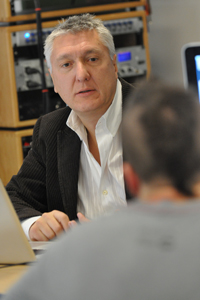FS-241
Don't see what you're looking for?
Main Site
Berklee.eduCampuses and Schools

Phil Farnsworth
Alum
Claudio Ragazzi
Position
Associate Professor
Affiliated Departments
Faculty Bio E-Mail
Telephone
617-747-8067
For media inquiries, please contact Media Relations
Courses Taught (4)
FS-341
FS-441
Career Highlights
- Guitarist
- Leader of the Claudio Ragazzi Quintet and the Ragazzi-Michelin Duo
- Member of the Pablo Ziegler Trio and Quintet
- Performances with Gary Burton, Joe Lovano, Yo-Yo Ma, Danilo Perez, Paquito D'Rivera, Dave Samuels, and Pablo Ziegler
- Recordings with Mili Bermejo, Joe Lovano, the Claudio Ragazzi Quintet, and Pablo Ziegler
- Composer for films, including Next Stop Wonderland and The Blue Diner, and TV series, including Arthur and Postcards from Buster
Education
- B.M., Berklee College of Music
In Their Own Words
"I’ve been scoring films, television series, independent films, and documentaries for a number of years now. When I came to Berklee as a student in the '80s, my teachers were people who had one foot on the street and another foot in the school; that's what I love about Berklee. So now I could be teaching today and recording a project or going to a film festival tomorrow."
"I believe in the complete musician. I think in order to make it in the real world today you have to have a specialty like film scoring, orchestration, or production, but you also need to know how to play your instrument, arrange, produce, and read. Twenty-something years ago I was graduating from Berklee, then I went to play music, then record, and then I ended up going into film scoring for almost twenty years, and now I come full circle back to Berklee as a teacher. So I think if you really want to make it as a professional musician, you try to be, as much as you can, a complete musician, someone who can perform, write, orchestrate, arrange, produce, score films, work in theater, or write for ballet—just know other forms."
"I came to Berklee to write big band music, and some of my friends at the time were studying film scoring. I never really got a big band together after I graduated, and some of my friends never got to write a score for a movie. So you really never know where you’re going to end up in this business. You’re always growing. That’s the beauty."
"Recently I was producing an album for a singer, and there were three film scoring students in the string section. One of them, I didn’t even know she played violin. That’s why Berklee’s a unique place, because even if you aren’t looking to hire Berklee students or graduates, you’re going to end up working with them. We’re so embedded in the professional world."
"I believe in the complete musician. I think in order to make it in the real world today you have to have a specialty like film scoring, orchestration, or production, but you also need to know how to play your instrument, arrange, produce, and read. Twenty-something years ago I was graduating from Berklee, then I went to play music, then record, and then I ended up going into film scoring for almost twenty years, and now I come full circle back to Berklee as a teacher. So I think if you really want to make it as a professional musician, you try to be, as much as you can, a complete musician, someone who can perform, write, orchestrate, arrange, produce, score films, work in theater, or write for ballet—just know other forms."
"I came to Berklee to write big band music, and some of my friends at the time were studying film scoring. I never really got a big band together after I graduated, and some of my friends never got to write a score for a movie. So you really never know where you’re going to end up in this business. You’re always growing. That’s the beauty."
"Recently I was producing an album for a singer, and there were three film scoring students in the string section. One of them, I didn’t even know she played violin. That’s why Berklee’s a unique place, because even if you aren’t looking to hire Berklee students or graduates, you’re going to end up working with them. We’re so embedded in the professional world."
Additional Related Links
Get More Information
By requesting information from Berklee, you will receive emails about our educational programs, student resources, facilities, and more based on your selections.
Thank you for requesting information.
Check your inbox for an email from Berklee. You will start to receive program information, updates, and deadline reminders.
Find the program that's right for you with Berklee's Find Your Program tool.